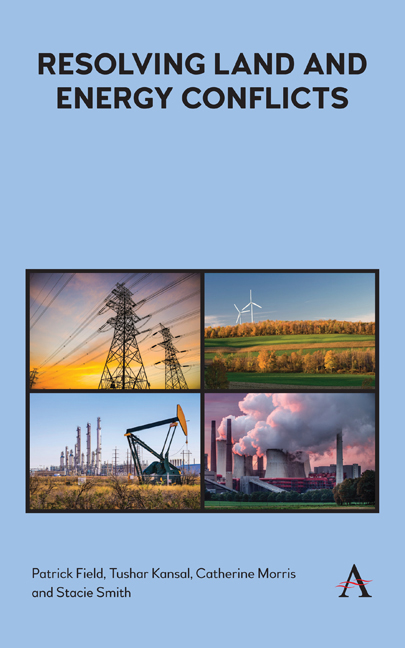Book contents
- Frontmatter
- Contents
- List of Illustrations
- About the Authors
- Acknowledgments
- 1 Introduction: The Complexity and Conflicts of Energy in the US Landscape
- 2 Land-Based Wind Energy Siting: The Not-So-Silent Wind
- 3 Nuclear Waste Siting: Getting Good People to Accept the Bad
- 4 Gas and Oil and Unconventional Shale: The New Old Frontier
- 5 The Linear Challenge: Transmission and Natural Gas Pipelines
- 6 Conclusions and Recommendations
- References
- Index
6 - Conclusions and Recommendations
Published online by Cambridge University Press: 29 May 2019
- Frontmatter
- Contents
- List of Illustrations
- About the Authors
- Acknowledgments
- 1 Introduction: The Complexity and Conflicts of Energy in the US Landscape
- 2 Land-Based Wind Energy Siting: The Not-So-Silent Wind
- 3 Nuclear Waste Siting: Getting Good People to Accept the Bad
- 4 Gas and Oil and Unconventional Shale: The New Old Frontier
- 5 The Linear Challenge: Transmission and Natural Gas Pipelines
- 6 Conclusions and Recommendations
- References
- Index
Summary
This book has sought to offer a snapshot of energy siting conflicts and collaborative opportunities in the United States across gas and oil, wind, transmission and disposal of nuclear waste. While each energy type and its production (or disposal) is governed by various jurisdictions, with different impacts and benefits, they also share commonalities. Our central question has been the following: in what ways can collaboration and conflict resolution be used to ameliorate the conflicts that inevitably arise? In our concluding chapter, we offer some overarching ideas and tools for consideration.
Quasi-judicial Decision Making as the De Facto Method of Dispute Resolution
We recognize that the US system— however much bargaining and collaboration may take place in and between formal processes— is a quasi-judicial system. Most of our present processes seek to adjudicate between competing claims at all levels of government. There are boards, commissions, committees and key decision makers that head up complex agencies with multiple interests even within them. These formal bodies seek to gather evidence, weigh benefits and costs and reach authoritative decisions. For wind siting, local and county boards play an important role, along with statewide energy siting boards of some kind (in many cases). For pipelines across state lines, the Federal Energy Regulatory Commission (FERC) and state utility commissions play a fundamental role, while states alone play a more central role in decision making for high-voltage electricity transmission infrastructure. For oil and gas drilling, private property rights fundamentally determine siting, along with the various ways to adjudicate conflicts that have been created over time. For nuclear waste, while the Department of Energy has an important role, the US Congress is still actively engaged in where, how and when it should be stored. While these adjudicatory systems vary across energy types and jurisdictions, they all share assumptions that key agencies can set the general rules while interveners of various kinds can collectively bring the necessary information, potential impacts and interests to the table to be sorted out by various boards and commissions. And, should these fail to resolve issues, the courts always remain as a backstop to conflict.
- Type
- Chapter
- Information
- Resolving Land and Energy Conflicts , pp. 115 - 132Publisher: Anthem PressPrint publication year: 2018



